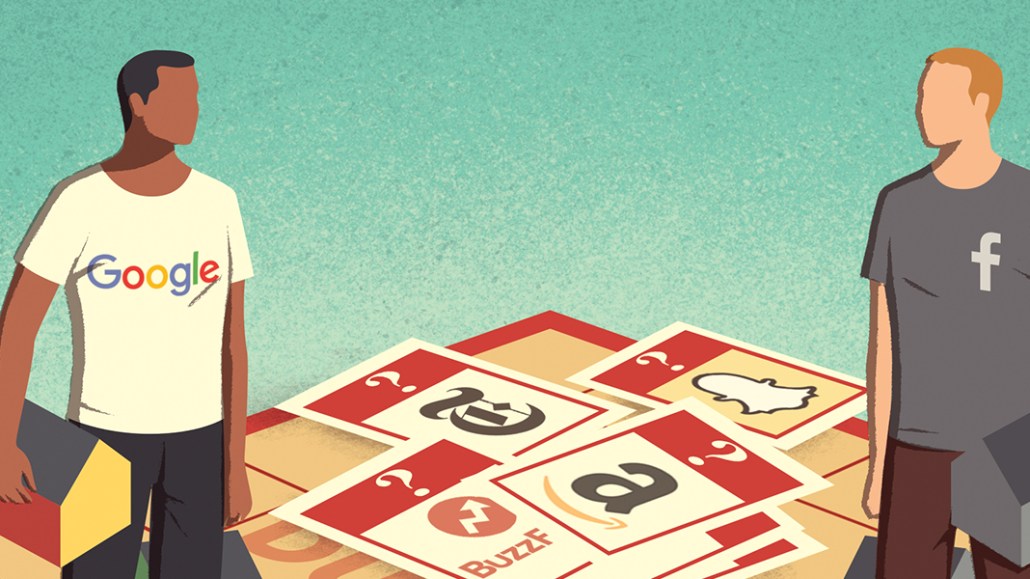Secure your place at the Digiday Media Buying Summit in Nashville, March 2-4
Local advertisers’ reliance on Google and Facebook grows during coronavirus crisis

Marietta, Georgia-based Fleming Flooring & Design Centers has made cuts to its advertising budget like many local businesses contending with the coronavirus crisis. But those cuts have not come across the board. Instead of advertising on historically important local media channels like TV, radio and billboards, the family-owned flooring dealer primarily spends its ad dollars on digital advertising platforms, like Google, which would make the search giant a likely subject to the cuts. Instead, Google has benefited from them.
“I did stop my Yelp stuff because I wasn’t getting a good enough return,” said Fleming CFO Rick Waugaman. By contrast, Fleming has increased the money it spends on Google search advertising. “With Yelp, that was something where if I hold off now and just spend more money on Google, I can make it up for it there,” Waugaman said.
Fleming does not appear to be an outlier. While local small- and medium-sized businesses, such as restaurants, retailers and home service providers, are spending less money on advertising, many are still spending some money on advertising, especially as states like Georgia, Florida and California begin to ease lockdown restrictions on businesses.
In mid-March, research firm Borrell Associates surveyed SMBs about whether they planned to increase or decrease their ad dollars over the next six months. At the time, 51% of those businesses said they planned to spend less money on advertising. By mid-April, the figure dropped to 39% of local businesses that said they planned to spend less on advertising with the remaining 54% expecting to increase or maintain their advertising budgets. And those ad budgets are largely expected to go to Google and Facebook.
“Spending money on Google and Facebook is the modern day equivalent of advertising on the Yellow Pages. You set it and forget it,” said Brian Wieser, global president of business intelligence at GroupM.
That’s good news for Google and Facebook, considering the small and local businesses represent “probably 65% to 75% of search and social media spend,” said Vincent Letang, evp of global market intelligence at Magna. But it’s bad news for the local TV stations, radio stations and publishers that have already seen their businesses decline as local merchants have shifted their ad dollars online.
“Ad spend piping into local channels will be significantly reduced for the long haul,” said Jed Williams, chief strategy officer at Local Media Association, an industry trade group that represents local media companies across TV, radio, print and digital.
Local media companies have historically relied on the strength of their own brands to attract local advertisers. But with local advertisers prioritizing sales channels that can show direct returns on their ad dollars, these local media companies need to adapt their sales strategies to prove they can play a contributing role to the merchants’ businesses, Williams said.
Some are. There are publishers putting on virtual graduation ceremonies for local schools that could lead to sales opportunities, Williams said. Local ad sales company Viamedia, which sells ads on TV and on digital platforms, launched an initiative in May called “Pay It Forward” for larger businesses in a local area to cover the ad costs of smaller businesses in that area, said Viamedia CEO Mark Lieberman.
Meanwhile, Cumulus Media-owned radio station Metro Atlanta provided Fleming with free on-air advertising, and a separate local sports talk radio station invited Waugaman and another Fleming exec for an on-air interview to talk about how Fleming adapted its business to the crisis, such as a virtual visualizer it added to its website for people to test its flooring products in their homes.
However, the local media companies continue to face an uphill battle in clawing back the dollars that local merchants are increasingly allocating to Google and Facebook.
Both Facebook and Google have put together financial programs for small businesses dealing the crisis. Facebook is giving out $100 million in cash grants and ad credits, and Google is offering $340 million in ad credits to existing advertisers. Additionally, local businesses have increasingly adopted the platforms’ video services during the crisis to show how they are adapting. For example, Fleming produced a virtual video tour of its showroom to show customers the products that it has in stock, Waugaman said. Google has seen an increase in interest from SMB advertisers in video advertising, said Kim Spalding, global product director for SMB ads at Google, though she declined to share any numbers.
Local businesses are also relying on the platforms to build up the online businesses they are pivoting to in cases when their physical stores are shut down. A chain of tanning and waxing salons that works with digital marketing agency Wpromote had to close its physical locations. However, that company also operates an e-commerce store.
In the past, the company prioritized promoting its salons over its e-commerce operation, but since March, it has stopped spending money to promote its salons and is spending more money to promote its e-commerce store than it had originally planned to spend.
“Retention is the new growth,” said Wpromote CEO Mike Mothner.
More in Marketing

Thrive Market’s Amina Pasha believes brands that focus on trust will win in an AI-first world
Amina Pasha, CMO at Thrive Market, believes building trust can help brands differentiate themselves.

Despite flight to fame, celeb talent isn’t as sure a bet as CMOs think
Brands are leaning more heavily on celebrity talent in advertising. Marketers see guaranteed wins in working with big names, but there are hidden risks.

With AI backlash building, marketers reconsider their approach
With AI hype giving way to skepticism, advertisers are reassessing how the technology fits into their workflows and brand positioning.





